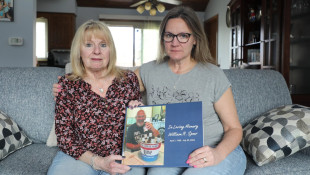
Sen. Fady Qaddoura (D-Indianapolis) authored Senate Bill 438 to address a shortage in home health aide providers in Indiana. He is pictured talking at a rally at a local church in support of another bill in February 2023.
Farah Yousry/ WFYIUpdated on Feb. 17
The Senate Health and Provider Services Committee passed two bills Wednesday, which aim to increase access to in-home health services and lower drug costs for consumers.
Senate Bill 8 would require pharmacy benefit managers, who serve as the middlemen between pharmaceutical companies, pharmacies and health insurance companies, to pass on the discounts they receive from drug makers to the patients at the point of sale.
And Senate Bill 438 would raise the reimbursement rate for home health aides and take other steps to addressing a critical labor shortage.
Both bills are headed to the Senate floor for a second reading before the full chamber.
Senate Bill 8: Passing on drug discounts to consumers
Senate and House Republicans have said that lower health care costs in Indiana is a top legislative priority this session.
SB 8, authored by Sen. Ed Charbonneau (R-Valparaiso), takes aim at drug prices through addressing how much money pharmacy benefit managers, or PBMs, get to pocket from the discounts and rebates they receive for prescription drugs.
Pharmacy benefit managers represent millions of patients on health plans and leverage that to negotiate lower prices for medications from drug makers.
SB 8 would require pharmacy benefit managers to pass on at least 85 percent of the discounts and rebates they receive from drug makers to individual patients at pharmacy counters or to all health plan members, in the form of lower premiums. The idea is that if individual patients’ collective leverage is being used to negotiate lower prices, then they should reap the benefit of that leverage.
“Forty-eight percent is the average rebate on a drug, 70 percent or more on the price of insulin. So not passing that through to the patient is very, very disrupting to their financial wherewithal,” said George Huntley, CEO of the Diabetes Advocacy Coalition, during a committee hearing Wednesday.
It’s unclear how much of those rebates PBMs and insurers get to take as profit. But according to data collected in Texas legislation passed in 2019, PBMs and insurance pocket 99 percent of the rebates.
Those who oppose the measure, however, say that the bill uses vague terms to define insurance plans and does not address the drug makers’ prices.
“Before you today is a bill that purports to lower the cost of prescription drugs and yet somehow does so miraculously, without the pharmaceutical manufacturer losing a single dollar,” said Joey Fox, a consultant who said he represents the health insurer CareSource and the Pharmaceutical Care Management Association.
Fox said he opposes the bill and that it could raise premiums across the board.
A study by the International Society for Pharmacoeconomics and Outcomes Research found that when drug rebates are shared with consumers, the estimated monthly premium increases would be less than $2 per member among the continuously enrolled, insured population. The study also found that an estimated 10 to 12 percent of insurance enrollees would see savings on their out-of-pocket spending if rebates were shared at the point-of-sale, and savings would range between $50 and more than $500 per year.
Senators voted 10 to 1 approving the bill and passing it out of committee.
The vote came after the Senate committee heard testimony including from representatives of Eli Lilly and Pharmaceutical Research and Manufacturers of America (PhRMA) supporting SB 8.
Sen. Vaneta Becker (R-Evansville) said she would vote yes because she wants to keep this issue at the forefront of the senate discussions but said she wants to see deeper discussions on the consequences of this bill. Sen. Liz Brown (R-Fort Wayne), who was the only senator to vote against the bill, said she agreed with the premise of what SB 8 would do but voted no because she feels the bill needs to be clearer.
Senate Bill 438: Addressing the home health aide shortage
The Senate Health and Provider Services committee unanimously approved SB 438 authored by Sen. Fady Qaddoura (D-Indianapolis). In its original form, SB 438 would have increased the reimbursement rates for home health aides in Indiana and reimbursed families for home health services. But after Senate amendments to the bill, SB 438 would only require the Family and Social Services Administration to perform a “comprehensive review of existing home health care services.”
Labor shortages of home health aides in Indiana have affected hundreds of families, patient advocates and lawmakers said.
Edward Curtis, father of 12-year-old Alia who has a disabling disease called Rett syndrome, said he and his wife had struggled to find a home health service provider to care for their daughter. Alia requires extensive care around the clock because her disease means she is unable to walk, talk or feed herself. Because of her disability, Alia is on government insurance, which works well to cover her pediatrician and clinical visits. The insurance also covers home health care services.
“The bad news is that it has been impossible to find an agency that can provide her with any nursing or respite care,” Curtis said.
During Curtis’ testimony before the Senate’s Health and Provider Services committee Wednesday, he said that he had contacted 79 providers approved by FSSA to find a home health aide or a respite care provider and not one said they have a provider available. It’s been 5 months since.
His story is echoed by many families across the state. This critical shortage is, in part, due to low Medicaid reimbursement rates for home health aides in Indiana.
“I know I've talked to people in my community that used to be homecare providers, they've gone out of business because they just could not afford to stay in business,” said Sen. Vaneta Becker (R-Evansville). “It's only going to get worse. Hospitals pay better, nursing homes pay better, and you just can't compete.”
Right now, hourly Medicaid reimbursement rates are set at nearly $49 for a registered nurse, $35 for a licensed practical nurse, $20 for a home health aide and $69 for an occupational therapist. These rates cover the provider’s hourly rate as well as the staffing agencies’ overhead expenses. But in a reality where health aides can get paid much more working at a nursing home and travel nurses can get paid double or triple the home health hourly rate in hospitals, patient advocates say it is incredibly hard to recruit highly skilled labor to provide critical home health services for people who need them.
The kind of care many families like the Curtises need could be a matter of life-or-death. And so, many parents and guardians faced with this dilemma quit their jobs to be able to provide the care themselves.
CORRECTION: This story originally said Senate Bill 438 would increase reimbursement rates for home health aides and reimburse parents for providing home health services they provide to their minor children with disabilities. This is inaccurate. In its current, amended form, SB 348 would only require a comprehensive review of the home health care services system by the FSSA.
Contact WFYI health equity reporter Farah Yousry at fyousry@wfyi.org. Follow on Twitter: @Farah_Yousrym.
 DONATE
DONATE





 View More Articles
View More Articles




 Support WFYI. We can't do it without you.
Support WFYI. We can't do it without you.